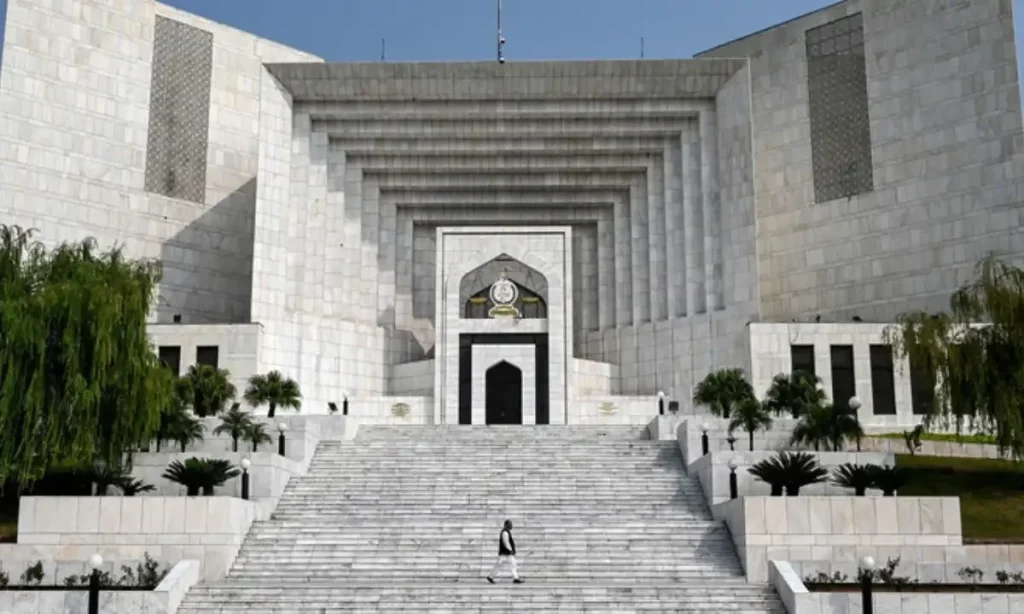ISLAMABAD: The Supreme Court’s seven-member Constitutional Bench, led by Justice Aminuddin Khan, resumed the critical hearing on the legality of military courts, focusing on their authority to try civilians.
Representing former Prime Minister Imran Khan, lawyer Uzair Bhandari presented his arguments, emphasizing that the armed forces derive their powers strictly from Article 245 of the 1973 Constitution. He asserted, “The military cannot operate beyond the scope of Article 245, which only permits their involvement in civilian affairs under specific circumstances.”
Justice Muhammad Ali Mazhar inquired about the official notification enforcing Article 245 during the events of May 9 and 10. Bhandari responded that a relevant notification exists in senior lawyer Aitzaz Ahsan’s petition, adding that the Punjab government had formally issued it. When questioned whether this provision was implemented nationwide, Bhandari clarified that it was enforced in Punjab, Khyber Pakhtunkhwa, and Sindh but was uncertain about Balochistan.
Justice Jamal Khan Mandokhail sought clarity on the relationship between Article 8(3) and Article 245, while Justice Mazhar pressed further, asking whether the military trials of civilians were backed by a cabinet decision. Bhandari affirmed that both the National Assembly and the cabinet had passed resolutions supporting military trials under three distinct laws.
However, Justice Mazhar pointed out that such resolutions and cabinet decisions hold administrative weight rather than constitutional authority. Justice Mandokhail reinforced this by stating, “Only Parliament has the power to amend the Constitution.”
Bhandari noted that the 26th Amendment had already set a precedent where provincial resolutions could dictate constitutional bench formations. He argued that the resolution supporting military trials after the May 9 protests was inherently political rather than constitutional.
Justice Mandokhail reminded the court that Parliament had previously passed a resolution opposing the ruling of five Supreme Court judges, suggesting that political motives often influence legal decisions. Bhandari maintained that the Constitution does not provide for the court-martial of civilians, and beyond Article 245, the army holds no judicial authority over civilians.
“If there exists another constitutional provision justifying military trials for civilians, I am unaware of it,” Bhandari stated.
Justice Mandokhail questioned whether courts established under Article 8(3) are authorized to conduct trials and whether military personnel—who operate under the executive—can assume judicial powers. Bhandari stressed that constitutional amendments cannot override fundamental rights and referenced the FB Ali case, which clarified that military laws under Section 2(D) do not fall under 83A.
Justice Aminuddin raised concerns about military jurisdiction over employees under Article C, questioning whether they take an oath. Bhandari clarified that even individuals under Article C are not subject to court-martial, which is strictly reserved for military officers.
Justice Aminuddin noted that the nature of the crime determines whether an individual falls under military jurisdiction. However, Bhandari countered that fundamental rights remain unaffected by the classification of a crime. He argued that constitutional courts can review pre-existing laws, reiterating that civilians can only be tried under Article 175. “Military courts operate outside Article 175 and cannot extend beyond the scope of Article 245,” he concluded.
As the session drew to a close, senior lawyer Salman Akram Raja invoked international legal principles, reminding the court, “Even Iblees was given the right to defend himself.”
The Constitutional Bench adjourned the case, scheduling the next hearing for Monday, February 24, when Uzair Bhandari will continue his arguments.


